 They say 2016 was a bad year, but from now on I expect every year to be worse than the year before, at least by 20th century values where "better" means increasing wealth, security, and rational management. The best we can hope for is that life will start feeling better in ways that are hard to quantify.
They say 2016 was a bad year, but from now on I expect every year to be worse than the year before, at least by 20th century values where "better" means increasing wealth, security, and rational management. The best we can hope for is that life will start feeling better in ways that are hard to quantify.I no longer believe in evil, just mistakes, and one of the core mistakes of the modern world is losing touch with the unquantifiable. According to Terence McKenna, young Decartes was visited by an "angel" who told him that the key to conquering nature is number and measure. 400 years later, number and measure have conquered the human soul, to the point where we think we must be crazy to be unhappy when we're surrounded by so many good numbers.
The Hindu trinity is Brahma the creator, Vishnu the preserver, and Shiva the destroyer. Western culture would say the Destroyer is the bad guy, but really it's all about balance, and what we have right now is an excess of preservation, and probably an excess of creation. I no longer believe in a hard crash, but it's getting to the point where, even if stuff doesn't go away, we just don't have room to care about it.
I don't do new year's resolutions because a resolution loses strength with every failure. Instead I call them points of emphasis, and my point of emphasis for 2017 is micro-scale toughness. It's hard to explain what toughness is. It's like, when the wind blows, a tough person instinctively turns toward the wind instead of away from it. I can do that with big things, but it takes practice to do it with little things.]]>